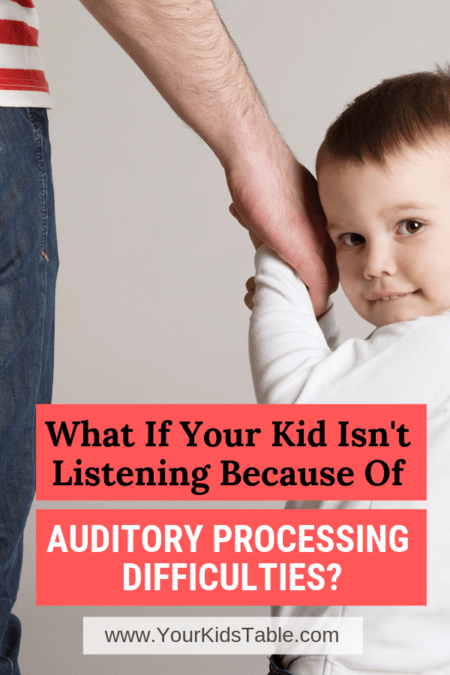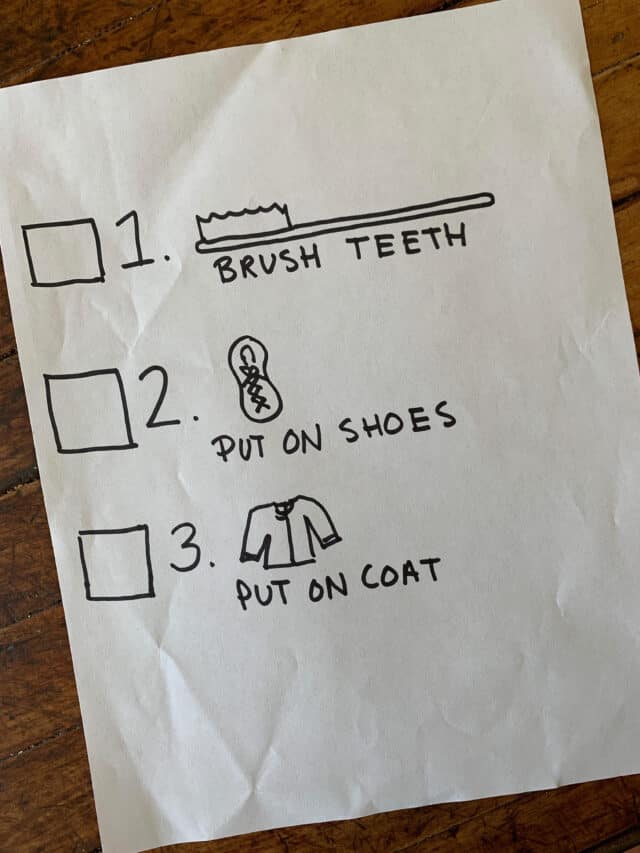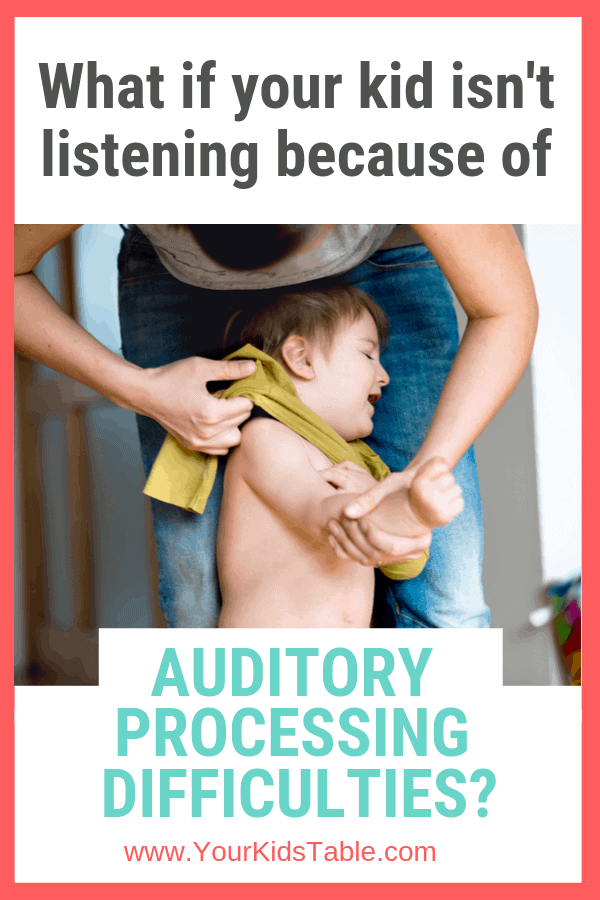Auditory processing difficulties are often missed in kids especially when they’re mild to moderate. Find out how they could be affecting your child and what you can do to help them listen and follow directions better than ever before!
I still remember sitting in that chair watching Full House. Or maybe it was Charles in Charge? Either way, I was around 8-9 years old and was intently following the TV show playing in front of me when suddenly I was jolted. I was startled and turned to find my mom just a few inches from my face, with a nervous laugh.
It was one of the moments when you feel like you’ve missed a joke that everyone else in the room is in on.
Everyone was staring at me. My mom then asked me a question I’ve heard probably 1000 times since, “Didn’t you hear me talking to you?” It was obvious from everyone’s reactions that my answer should be yes, but I couldn’t recall her saying anything. I was engrossed in Stephanie and DJ’s latest sister fight.
I was old enough to hear the concern in my mom’s voice when she asked again, “You really didn’t hear me?”
What Was Really Wrong With Me….
Turns out my mom was worried there was something wrong with my hearing.
There wasn’t.
Then she thought something neurological was going on, because although she’d noticed this tenancy for me to “tune out” as she put it, she never saw either of my sisters do the same thing.
The doctors assured her that I was fine, and the truth is I was, but there was an explanation for seemingly sudden deafness: Auditory Processing Difficulties.
What Are Auditory Processing Difficulties
Auditory processing is how our brain interprets the sounds we hear, it doesn’t have anything to with our actual ability to hear. It lets us compute directions or repeat back a joke we just learned. It’s the “thinking” our brain does about what we’re hearing, and it’s quite complex.
While I won’t go into the neuroscience of auditory processing, what I do want you to know is that these minor or more severe difficulties can affect how kids learn and follow directions.
And, it’s easily missed.
Signs of Auditory Processing Difficulty
Auditory processing difficulties can vary from child to child because of how complex the process is, and for lots of kids like myself, it doesn’t necessarily impact learning. In my case, it’s kind of a quirk that my mom and husband joke about, because yes, if you try to talk to me while I’m watching TV, on my laptop, or have a book in my hand, well you might as well be an invisible, because my brain won’t be listening to you.
My auditory processing difficulties have the biggest affect on me when I’m listening to somebody quickly rattle off a phone number or how to spell their name. If they go too fast, which most people do, it’s hard for me to isolate each number in the string of numbers I just heard.
I’m able to learn through listening, but visuals help me grasp concepts much better.
Those are just a few examples of how you can see some auditory processing difficulties show up. But, let me put it all together in a list for you. As you read the list below, look for any signs that you might see in your child:
- Difficulty focusing on more than one sound at a time
- Difficulty interpreting any sound or noise when focusing on a different task
- Difficulty writing down numbers or word spellings from oral diction
- Seems not to listen when people are talking or “ignores you” often
- Inconsistently follows directions or misses certain steps

Who Do Auditory Processing Difficulties Affect?
Auditory processing difficulties can affect anyone, although I’ll tell you there’s a strong genetic component. My mom shows some difficulties, but in different ways, she doesn’t “tune-out” when watching/reading something else. But, my oldest son does!
It’s interesting to be the one talking and him not responding because he’s reading a book. More than once, my husband (jokingly) has said, “That’s exactly what it’s like. Now you know.”
So, lots of kids can have these difficulties.
But, auditory processing difficulties definitely wades into sensory processing territory. That means that kids that have known sensory needs or issues have a higher likelihood of facing these challenges. That would include kids with mild sensory needs as well as children that have a diagnosis of Autism or ADHD. Kids can have sensory difficulties related specifically to auditory sensory processing.
While my difficulties are quite mild, that’s not always the case. The difficulties could have a big impact on how your child communicates and learns.
Could Your Child Have an Auditory Processing Disorder?
According to KidsHealth.org, Auditory Processing Disorders affect about 5% of all kids and are hallmarked by a difficulty in learning to talk because they may not distinguish different sounds they’re hearing. Kids with this disorder struggle to follow directions and learn in environments where there is any noise at all.
Noisy places can also be upsetting.
Some also argue that ADHD is sometimes a misdiagnosis for Auditory Processing Disorder. To read more about the actual disorder click here.
Why It Matters If Your Kid Has Auditory Processing Difficulties
Of course, I don’t want any of that to scare you, chances are your child doesn’t have an auditory processing disorder. But, what I do notice, as an occupational therapist, is that lots of kids have a low to moderate level of difficulty with it and nobody knows that it’s a piece of the puzzle.
Kids can seem bad or have difficult learning and we bang out heads against the wall, not knowing what to do.
Stepping back and asking yourself, “Are they not listening to me right now because this is a power struggle, or are they not listening because I’ve given them too many steps to complete?” is a great place to start.
Once you see the auditory processing difficulty is present, you’ll begin to notice it in all sorts of ways that you never imagined.

Affiliate links used below. See our full disclosure.
Ways to Help Kids That Have Auditory Processing Difficulties
The good news is that auditory processing can significantly improve! For kids with a disorder or significant difficulties that are affecting their learning, speech, or social skills, it’s important to get an evaluation with a speech therapist that has experience treating these challenges.
But, there are some tricks you can use at home to help support your child as well, especially if they have more of a mild case:
- If you’re child doesn’t seem to hear you, go to them instead of talking from across the room. Crouch down to their level and look them in the face. You might need to touch their arm or chin to get their attention first. Give them a second or two to acknowledge that you’re there before speaking to them.
- If your child is having a hard time focusing, eliminate other noises from the environment. Turn off the TV or music. And, if someone is cutting the grass outside, move to another room or close the windows. Or, you might need to wait until their done with the lawn mower before working on homework.
- Initially, focus on 1-step directions. Instead of saying, “Pick up your shoes, put them in the closet, and brush your teeth.” Try just the first step, “James, pick up your shoes that are next to the coffee table.” You may need to repeat this and use tip 1 above as well. Over time, as they improve, you can add another simple step.
- As parents, our minds are managing tons of tasks and it’s easy for us to give an unclear direction like, “Hey, um, can you find your, um, flip flops, I mean shoes.” When giving directions, always choose your words wisely keeping it as clear as possible.
- Give them a visual. If you need your child to follow multiple steps before going to bed, getting ready for dinner, or getting ready for school, then make a checklist with simple step by step instructions. This checklist can also be simple pictures with check boxes next to them below. See mine below or check out this visual schedule:

- Have a pair of noise cancelling headphones to use for when things get too noisy for your child. We use a pair like this, but other families have liked this soft headband style that can play one type of music they want to hear. Some kids also find it helpful to have a quiet spot or sensory tent to retreat to when there’s too much noise.
Now that you’ve learned about auditory processing difficulties, do you suspect that your child could be affected by them? If so, tell us in the comments below. Your responses will help somebody else!
And, if you’d like to learn more about sensory and how it might be affecting your child, then check out my free checklist of 22 Sensory Red Flags You Could Be Missing. I’ll send it right to your inbox, it’s great insight into the quirks and behaviors your child is having.
Click here to get the Free Printable!
More on Sensory Processing
Simple Calming Activities for Active or Overwhelmed Kids to Start Today!
17 Extraordinary Sensory Activities That Help Toddlers Learn and Grow
Real Help for Kids Sensitive to Noises with 5 Easy Steps!
Alisha Grogan is a licensed occupational therapist and founder of Your Kid’s Table. She has over 14 years experience with expertise in sensory processing and feeding development in babies, toddlers, and children. Alisha also has 3 boys of her own at home. Learn more about her here.

My son has a hard time focusing. He often complains of noise in the classroom but not so much at home. Only when he tries to focus on suddenly he might cover his ears that it’s too noisy. He is falling behind in school. We did talking Theraphy when he was younger but is doing well when his talk now that he is 7. However, learning to read and write is the new challange. As a toodler he would have melt downs when he had to wash he is hands and complains about the soap. He washes hands now without problem but at times complains of how some things might feel. He doesn’t like to lay with slime and avoid painting for a awhile until we used gloves. Now he paints with our gloves. I’m thinking he might have sensory processing disorders including hearing which might have caused the delay in speech. Not sure? Any help will be greatly appreciated
Hi Flor! Thanks for reaching out! Everything you described definitely sounds sensory related! We recommend finding out the underlining cause and then go from there. We have a ton of sensory resources on our site, even a free sensory workshop that helps explain everything and provides tips. Save your seat here!
Best,
Kalyn
I’m fairly sure that our adopted son has some level of challenge with Auditory processing. I have seen signs since he joined our family a few years ago but initially I didn’t understand exactly all the things that we needed to work through with him due to the trauma in his past. However, I still see signs – I answered yes to all of the ‘signs’ that you listed in bullets above. I’m going to go ahead and look for a speech therapist to evaluate him. Thank you for insight. QUESTION… when there are situations when there is a lot of noise around him, he often gets very loud. It is as if he is trying to match the noise level. Is this common for kids who have Auditory processing challenges? Thanks!
Yes! I have always suspected and questioned since around 18 months, ADHD, but than doubtfully. This is definitely my daughter! Help!
Hey Kaili,
Yes, it can be so hard for this diagnosis! I’d check out the recommendations from the article!
Best,
Desiree
WOW! I needed this today. This could explain SO MUCH about my 5-year-old son. He’s so darn smart that he doesn’t seem to have any trouble with school (yet), but we are struggling with some tasks at home, the overload in loud places, and the complete “zone out” when he is involved in something. Might explain some behaviors from his father also 😀 Thank you also to those who have chimed in with some of the other methods that have helped!
Awesome Vanessa,
Happy this is helping you locate what might be happening at home! If you need more information on sensory we do have our Free Workshop that goes into more detail!
Best,
Desiree
Great info Heather. I have two with sensory and auditory processing disorder. It affects them both differently. My daughter went through a complete Listening Program on CDs and that was because her sensory bled well over the lines and she couldn’t tolerate most noises and if there was a noise she would shut down completely or melt down. She is now 15 and we laugh on her “dog hearing” as she can still hear things I can’t (like lawn mowers well out of our neighborhood) but been a good while since she had a melt down over it. My son is one who we have to do visual task steps for as he struggles so hard following verbal instructions that comes in a string. We also have to practice a physical soft touch to his shoulder to get his attention away from LEGOs or he doesn’t hear us especially if there is any background clutter like a TV or radio. He is 10.
Hi! Is there a way I can print this without advertisements and all the words 2 inches on the left side of the page? I would love to share this with parents. Thankyou!
Both my children have sensory difficulties and auditory processing is definitely one of them. We had good success with my daughter with a listening therapy course with specially modified CD’s that she listened to daily. We were very lucky to have an OT who specialised in sensory integration dysfunction at the time!
She is the one with fewer eating difficulties now too – my son, who never had the listening therapy, is far more picky.
THANK YOU for posting about APD. My husband was diagnosed with it as 29-year old. So late in the game. So much heartache and struggle through a school system not meeting and overlooking his needs that have left him feeling “dumb”. There needs to be so much more awareness here. And frustratingly insurance doesn’t often cover therapy for APD. Thank you for raising awareness. We will be paying close attention to our daughter as she grows. She’s 15 months now.
Yes, we agree, wish there was more awareness! Thank-you for sharing your story!
Best,
Desiree
Hey Stacey,
Thanks for sharing! Yes, the listening therapy can do wonders for kids!!
Best,
Desiree
My husband and both sons have this! I can’t text my husband too much even. He gets lost in all the words and so I just send him phrases.
You’ve learned how to adapt, so that’s great! Glad you have figured out what works!
My 6 year old son has auditory processing delay- among sensory processing disorder as well. When he was little at daycare they wanted me to have his hearing tested …that was not it. Later when evaluated for an IEP at almost 4 years old they discovered his auditory processing was one standard deviation below normal…so he’s not ignoring or being rude …he really thrives on visuals or songs to remember things. This is also why Ive chosen a Montessori education since he was 4 …very limited oral lessons and oral direction whereas traditional learning seems to thrive on the lecture. I hope it gets better as time goes on but knowing how we need to adapt has been helpful!
YES Heather!! Thank-you for the share. It can be hard, but knowing those accommodations are great to help these kids thrive!!